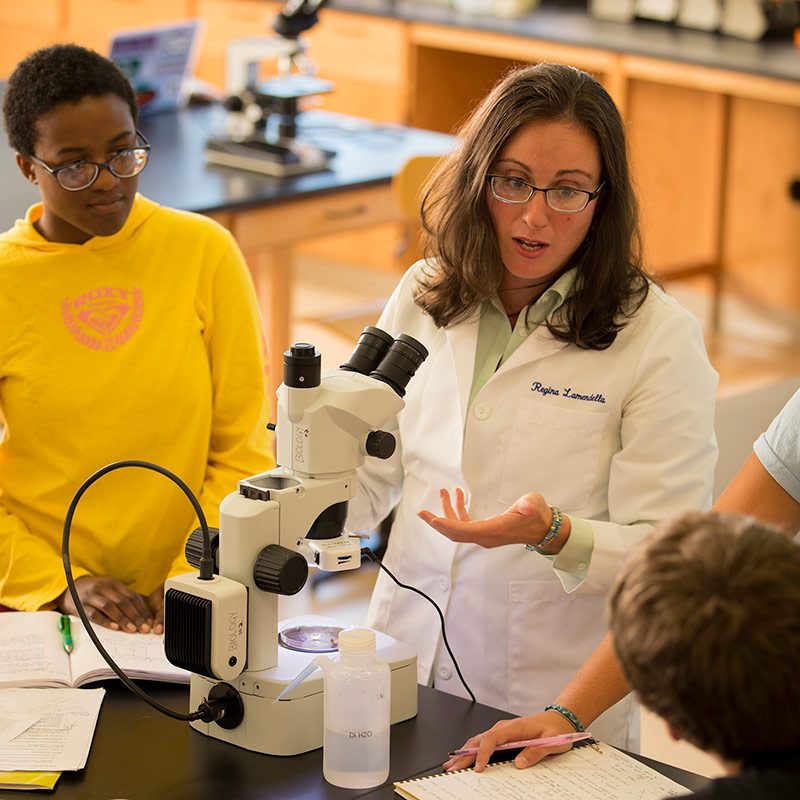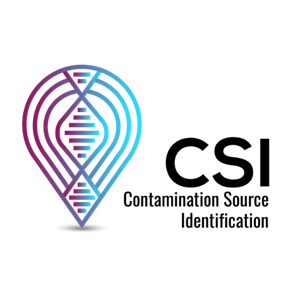
Earn Your Masters Degree in Bioinformatics
There is an incredible need for properly prepared bioinformaticians, to address the current revolution in biology. The field of bioinformatics will be a constant necessity, as the amount of data keeps growing and the nature of it keeps changing.
Juniata is a leader in the GCAT-SEEK Consortium, a group of educators who seek to incorporate cutting-edge, high-throughput DNA sequencing technologies and computational methods into their curricula to provide students with hands-on opportunities to apply this technology to investigate biological questions. To further specialize their education, students can design their curriculum to follow one of two concentrations: Computational concentration or Biotechnology concentration.

Earn Your Masters Degree in Bioinformatics
There is an incredible need for properly prepared bioinformaticians, to address the current revolution in biology. The field of bioinformatics will be a constant necessity, as the amount of data keeps growing and the nature of it keeps changing.
Juniata is a leader in the GCAT-SEEK Consortium, a group of educators who seek to incorporate cutting-edge, high-throughput DNA sequencing technologies and computational methods into their curricula to provide students with hands-on opportunities to apply this technology to investigate biological questions. To further specialize their education, students can design their curriculum to follow one of two concentrations: Computational concentration or Biotechnology concentration.

Earn Your Masters Degree in Bioinformatics
There is an incredible need for properly prepared bioinformaticians, to address the current revolution in biology. The field of bioinformatics will be a constant necessity, as the amount of data keeps growing and the nature of it keeps changing.
Juniata is a leader in the GCAT-SEEK Consortium, a group of educators who seek to incorporate cutting-edge, high-throughput DNA sequencing technologies and computational methods into their curricula to provide students with hands-on opportunities to apply this technology to investigate biological questions. To further specialize their education, students can design their curriculum to follow one of two concentrations: Computational concentration or Biotechnology concentration.
MBIN Program at a Glance
-
30-32 Credits
-
On-Campus and Online
-
Rolling Admissions
-
2 Distinct Concentrations
-
Available as a 4+1 Program
See how a Juniata College graduate degree equips you for success!
Timely reminders, helpful resources, and key insights—delivered to you.
Let us know how to best reach you, and our admissions team will be in touch!

A Pathway with Purpose
Juniata College Master of Bioinformatics graduates will leave with advanced skills in computational biology, data analysis, and the integration of biological and technological knowledge. They will be prepared to apply bioinformatics tools to real-world challenges in healthcare, biotechnology, and research. Graduates will also gain the interdisciplinary collaboration and problem-solving abilities needed to lead in data-driven fields of science and industry.
A Pathway with Purpose
Juniata College Master of Bioinformatics graduates will leave with advanced skills in computational biology, data analysis, and the integration of biological and technological knowledge. They will be prepared to apply bioinformatics tools to real-world challenges in healthcare, biotechnology, and research. Graduates will also gain the interdisciplinary collaboration and problem-solving abilities needed to lead in data-driven fields of science and industry.
MBIN Concentration Tracks
-
Computational Concentration
By blending computer science with biology, you’ll learn how to use powerful computational tools to tackle real-world challenges in genomics, medicine, and biotechnology—preparing you for a cutting-edge career at the intersection of health and technology.
-
Biotechnology Concentration
Use computational tools to analyze genomic and proteomic data, support biotechnological innovations, and solve problems in medicine, agriculture, and industry. This concentration prepares graduates for careers in biotech companies, research labs, and healthcare, where data-driven approaches drive innovation.
Learn From Expert Faculty
93% of Juniata College faculty hold the highest degree in their field, and they bring extensive real-world experience—offering students a rich and practical learning environment. They are dedicated mentors who support student success through innovative teaching, personalized guidance, and active involvement.
Admission Requirements
Entry into the Master of Bioinformatics program requires an earned bachelor’s degree in the natural sciences or computer science.
- Application with statement of purpose
- Resume
- Official College Transcript(s)
- No Application Fee* or Test Scores Required
*$50 International Applicant Fee
Biotech Collaborations
-

Wright Labs
Wright Labs applies novel microbial genomics methods to solve medical and environmental problems within a network of +80 academic, governmental, and private institutions. Founded at Juniata College’s Center for Entrepreneurial Leadership, Wright Labs is a story of student-led scientific innovation and entrepreneurship. We hire students and post-graduates through a plethora of research internships and new-hire opportunities. These high-impact practices enable researchers to create, dream, and design something of their very own, directly facilitating their self-discovery process.
-

CSI - Contamination Source Identification
CSI is the first, comprehensive technology that delivers nucleic acid sequencing data from clinical samples in a timeframe allowing for rapid diagnosis and selection of targeted antimicrobial therapies, thereby improving antibiotic stewardship. Our proprietary databases are continuously re-populated with pathogens identified from spatiotemporally relevant samples, keeping pace with rapid pathogen evolution and transmission routes. In addition, CSI computational pipelines perform real-time detection of antibiotic resistance genes, key to surveillance, infection control, and modeling emergence of antibiotic resistance.
-

The Central Pennsylvania Clinic
The Central Pennsylvania Clinic – A Medical Home for Special Children and Adults, is incorporated as a non-profit medical clinic providing comprehensive medical care in the service of people with special needs caused by genetic disorders. This unique center serves patients, and their families, from the Plain and English communities of Central Pennsylvania.
Program Contact

Regina Lamendella Biography →
Sabbatical
- Valko Professor of Natural Sciences
- Director of Bioinformatics
- VLB 1076
- (814) 641-3553
- lamendella@juniata.edu
 skip to content
skip to content







